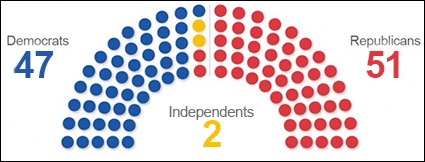By Jim Ellis
Sept. 21, 2018 — From the 35 US Senate in-cycle races it is clear that the major contests are narrowing to 16 competitive political battles. A 17th campaign, the one in California between Sen. Dianne Feinstein (D) and state Sen. Kevin de Leon (D-Los Angeles), is also competitive, at least to a degree, but since both candidates are Democrats the outcome will not alter the partisan composition. Therefore, the Golden State does not factor into the battle for the Senate majority.Today, we look at eight of the races and provide a quick update on the latest developments. Concentrating on the 16, if Republicans win any four they will hold at least a bare majority.
ARIZONA
The race between Reps. Kyrsten Sinema (D-Phoenix) and Martha McSally (R-Tucson) has been flip flopping in the polls. Seven polls have been released in September. Rep. Sinema has led in five by an average of 3.4 percentage points. Rep. McSally took the lead in two surveys, with a mean of two percentage points.
A new independent group entitled Defend Arizona has launched a series of ads attacking Sinema that highlight previous statements advocating leniency for men who engage in child prostitution when the latter individual looks older than her age. How this line of attack will affect the race remains to be seen.
FLORIDA
Sen. Bill Nelson (D) is facing the strongest challenge of his career from Gov. Rick Scott (R). This race has been frequently polled, and no September study gives either man a lead of more than two points. Three polls project a Scott lead of one or two points. One survey gives Sen. Nelson a one-point edge, and a fifth study finds the two candidates deadlocked in a flat tie at 49 percent apiece.
Some believe that Tallahassee Mayor Andrew Gillum’s presence on the statewide ticket as the Democratic gubernatorial nominee will help Sen. Nelson, others believe it will hurt. Those arguing that Gillum helps say that he will increase minority turnout, and that Nelson will tangentially benefit because such voters would likely vote straight Democratic. Those believing Gillum is a negative indicate that he will be portrayed as being too far left, which could be an impetus to spur more conservatives to vote.
INDIANA
Sen. Joe Donnelly (D) faces former state representative and international businessman Mike Braun (R). Fox News conducted the only September poll in this race. Among likely voters, Braun had a two-point lead. But the registered voter universe tipped the scale toward Sen. Donnelly by a margin of just one point.
This is one more race that is a pure toss-up as we approach the last month of campaigning.
MICHIGAN
Retired Army Ranger and manufacturing business owner John James won the Republican nomination on Aug. 7 but so far has yet to make a dent in Sen. Debbie Stabenow’s polling advantage. Three September surveys were released, and Sen. Stabenow maintains an average margin of 18.7 percent. James will have to make a major move soon if he is going to position himself to be a factor in the closing days.
MINNESOTA
The special election between appointed Sen. Tina Smith (D) and state Sen. Karin Housley (R-Stillwater) has the potential of becoming highly competitive. Though Minnesota is a reliably Democratic state there are signs the electorate is moving to the right. Rep. Tim Walz (D-Mankato), however, has developed a lead in the open governor’s race making the Senate race even tougher for Republicans.
Sen. Smith may be positioning herself too far left and, if the Housley campaign can draw an effective contrast, an upset is within the realm of possibility. The latest poll in this contest (Mason-Dixon Polling & Research; Oct. 10-12, 800 likely Minnesota voters) finds Sen. Smith holding a 44-37 percent advantage.
MISSISSIPPI
Appointed Sen. Cindy Hyde-Smith (R) stands for election in November after being appointed when former Sen. Thad Cochran (R) resigned his seat for health reasons.
No September polling has been released, but it appears clear that the jungle primary format will produce a run-off election on Nov. 27, likely between Sen. Hyde-Smith and former US Agriculture Secretary and Mississippi Congressman Mike Espy (D).
MISSOURI
The Missouri Senate contest is like Florida in that the incumbent and challenger routinely trade the polling lead, but always by a slim margin. Though the state is becoming reliably Republican, Attorney General Josh Hawley (R) has yet to pull away from Sen. Claire McCaskill (D).
Four polls have been released in September after 22 studies were published from early July 2017 through August of this year. The spread reached seven points or above only in three of the 22 surveys. In the September polling, Sen. McCaskill leads by two and three points, AG Hawley has a three-point advantage in another, and the latest YouGov report finds the two tied at 45 percent apiece.
MONTANA
Though Sen. Jon Tester (D) has what appears to be a strong hold on his state, the three surveys released since the 4th of July find a close contest between he and state Auditor Matt Rosendale (R). Two of the polls found Tester holding leads of three and two points. Another found Rosendale up two points. The latest release, a Sept. 10-14 survey from YouGov finds Sen. Tester slightly ahead, 47-45 percent.
It is surprising to some that this race is closing. It now appears that the contest will definitively break late, and while all of the empirical evidences suggests that this political race is anybody’s game Sen. Tester still must be considered the favorite.

